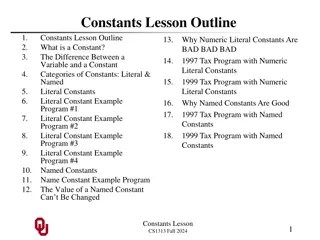Local and Global Variables in Programming
Local variables are declared inside a function or block and can only be accessed within that scope, while global variables are declared outside functions and can be accessed throughout the program. This article explains the differences between local and global variables and provides examples to illustrate their usage.
Download Presentation

Please find below an Image/Link to download the presentation.
The content on the website is provided AS IS for your information and personal use only. It may not be sold, licensed, or shared on other websites without obtaining consent from the author.If you encounter any issues during the download, it is possible that the publisher has removed the file from their server.
You are allowed to download the files provided on this website for personal or commercial use, subject to the condition that they are used lawfully. All files are the property of their respective owners.
The content on the website is provided AS IS for your information and personal use only. It may not be sold, licensed, or shared on other websites without obtaining consent from the author.
E N D
Presentation Transcript
Prepared by :-k.vijaya kumar Lecturer in computers, S.V.C.R.GDC.,Palamaner
A scope is a region of the program and broadly speaking there are three places, where variables can be declared Inside a function or a block which is called local variables, In the definition of function parameters which is called formal parameters. Outside of all functions which is called global variables. We will learn what is a function and it's parameter in subsequent chapters. Here let us explain what are local and global variables.
Variables that are declared inside a function or block are local variables. They can be used only by statements that are inside that function or block of code. Local variables are not known to functions outside their own. Following is the example using local variables #include <iostream> using namespace std; int main () { // Local variable declaration: int a, b; int c; // actual initialization a = 10; b = 20; c = a + b; cout << c; return 0; }
Global variables are defined outside of all the functions, usually on top of the program. The global variables will hold their value throughout the life-time of your program. A global variable can be accessed by any function. That is, a global variable is available for use throughout your entire program after its declaration. Following is the example using global and local variables
#include <iostream> using namespace std; // Global variable declaration: int g; int main () { // Local variable declaration: int a, b; // actual initialization a = 10; b = 20; g = a + b; cout << g; return 0; }
A program can have same name for local and global variables but value of local variable inside a function will take preference. For example #include <iostream> using namespace std; // Global variable declaration: int g = 20; int main () { // Local variable declaration: int g = 10; cout << g; return 0; } When the above code is compiled and executed, it produces the following result 10
When a local variable is defined, it is not initialized by the system, you must initialize it yourself. Global variables are initialized automatically by the system when you define them as follows DataType Initializer int 0 char '\0 Float 0 Double 0 Pointer NULL It is a good programming practice to initialize variables properly, otherwise sometimes program would produce unexpected result.























